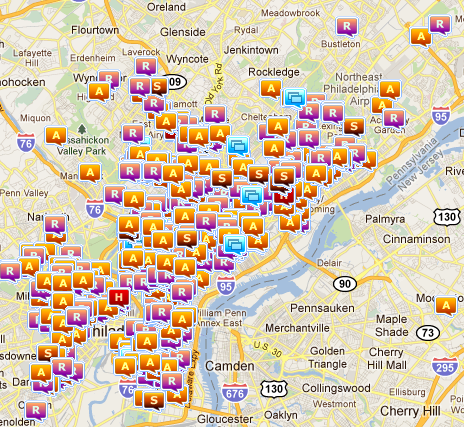Preliminary public safety reports from the last six months, the deepest public archive to date, are now being published online by the Philadelphia Police Department in a partnership with CrimeReports.com.
“We want to help create a cycle in which police departments share more data and the general public delivers value back with more information from their communities,” said Greg Whisenant, the CEO of Public Engines, which publishes CrimeReports.
The five-year-old Salt Lake City firm is offering at no cost its proprietary software that is installed on the police’s private server to extract, clean and publish incident reports, said CEO Whisenant. Normally the software would cost at minimum “a few hundred dollars a month,” he said. There is currently no API for the Philadelphia police data, though Whisenant said his company could provide one.
“We first need to get agencies comfortable with the idea of releasing data,” Whisenant said. “There are other services we provide that we think in the future could interest [our clients], like tools for citizens to provide anonymous tips via text or smartphones.”
Calls and e-mails for comment from the police department’s office of media relations were not returned in time for publication.
Currently, sharing the last six months of data is the standard among CrimeReports clients, though Whisenant said “eventually I think we’ll see agencies offering an open API of all their data.”
Previous to the July announcement, the police department’s GIS infrastructure-based Google-based mapping service would only allow access to data from 30-day periods, though information does go back to 2007 the previous 30 days and developers in the city had found access to the database in previous hackathons. This increased data release was cited last year as another coming development from a police department aiming to make use of technology.
“We keep data longer than six months and can accommodate historical data,” Whisenant said, so the possibility for a rich API with years worth of data is possible if political support is there for it.
Real estate site Trulia has a popular Philadelphia crime map that relies on SpotCrime data, using news accounts and incident reports, though timing is limited unless after a free sign up neither date beyond the 30-days previously provided by the police department. SpotCrime users who are signed in have access to more than three years of data, which is now updated by daily spreadsheet releases from the police after having scraped from the police mapping website and using Inquirer reports at its start, said founder Colin Drane.
Other police departments in the region providing data to CrimeReports.com now include Norristown, Evesham, Moorestown, Haverford. CrimeReports.com claims to offer ‘affordable cloud-based software tools’ for more than 1,800 law enforcement agencies in the country.
“The City of Philadelphia and its police department, starting with Commissioner Ramsey is creating a beter partnership with the public,” said Whisenant. “They seem eager, and I believe it’s real.”
Join the conversation!
Find news, events, jobs and people who share your interests on Technical.ly's open community Slack

Philly daily roundup: Jason Bannon leaves Ben Franklin; $26M for narcolepsy treatment; Philly Tech Calendar turns one

Philly daily roundup: Closed hospital into tech hub; Pew State of the City; PHL Open for Business

A biotech hub is rising at Philadelphia’s shuttered Hahnemann Hospital campus


